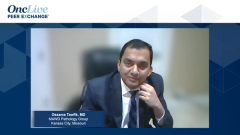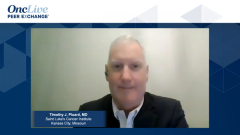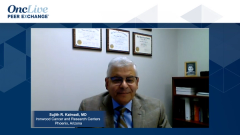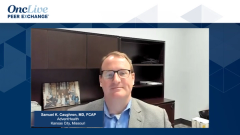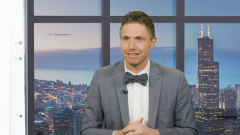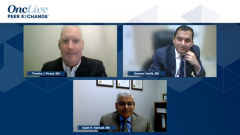
Addressing Barriers to Adequate Biomarker Testing in Cancer Care
Key opinion leaders highlight challenges to adequate biomarker testing in cancer care and consider the value of collaboration to overcome these barriers.
Episodes in this series

Transcript:
Timothy J. Pluard, MD:Let me ask you about how you manage it all in clinical practice. I’ll start with you, Sujith. If you go back about 10 years, we would do biomarker testing almost sequentially. Like in lung cancer, we’d test for EGFR. If EGFR was negative, we’d look for ALK or ROS. But with the proliferation and the sheer number, tissue becomes a limiting factor. You alluded to the liquid biopsies, but these days we’re getting limited samples. How do you prioritize? How do you test to get the maximum information from a biopsy?
Sujith R. Kalmadi, MD: The first step is to educate my interventional radiologists, pulmonologists, and gastroenterologists about the requirement of tissues. I tell them I need the size of an uncooked grain of rice to test my patients. That’s what I insist when I go into the tumor boards to make sure radiologists are doing core biopsies rather than fine-needle aspiration cell blocks, which limits a lot of our testing. In breast cancer we have a big issue. In bone-only disease, it’s very hard to get comprehensive genomic testing because of acid elution and other things they do for diagnosis, which is a limiting situation.
I’m going to step outside the boundaries of NCCN [National Comprehensive Cancer Network] and say that in my practice, for any patient with metastatic disease—regardless of the disease—there are many disease-agnostic therapies available. There’s TMB [tumor mutational burden], where immunotherapy has shown benefit. You now have BRAF, which has shown benefit in several malignancies. You have BRCA, where we’re seeing improvement with PARP inhibitors. [This applies to] ovarian, breast, and pancreatic cancer. A lot of these are disease-agnostic treatments that patients need to know about. I strongly feel that knowledge is power. In my practice, anybody with an incurable diagnosis will get comprehensive somatic mutation testing with any of the standard commercial platforms—FoundationOne, Tempus, NeoGenomics. I need a comprehensive genomic panel on all of them.
The 1 part that’s starting to develop is the RNA-sequencing technology, which involves adding RNA in relation to comprehensive genomic profiling. There’s some benefit, but obviously I need comprehensive genomic profiling. If I don’t get enough tissue, all of them will get a circulating tumor DNA test, which I hope will yield an actionable answer 70% of the time.
Timothy J. Pluard, MD:Ossama, from the pathologist perspective, tell us about tissue preservation, utilization, and how you maximize the tissue that you get.
Ossama Tawfik, MD: Tissue has become a very important piece of the puzzle for the care of patients, particularly patients with cancer. I’m interested in having T-shirts that say “Tissue is the issue” for everybody. In general, the practice of medicine is a team sport. From my perspective, it’s important to have a team of individuals working together from the point the patient walks through the door. [Regardless of] whether this [patient] is going to be seen by a specialist, the entire culture needs to be transformed into how to adequately treat these patients in this day and age.
Keep in mind that we have to change the culture of the entire team: a family practice doctor, an oncologist, a radiologist, a pulmonologist, a GI [gastroenterology] doctor, a pathologist. Each team should then go back to their staff and transform the culture, to make sure we’re preserving enough tissue so we can get it and do all the testing we want to do. From my end, I have to work on the individual who’s procuring the sample—usually an interventional radiologist, a mammographer in breast cancer, an EBUS [endobronchial ultrasound] specialist in lung cancer, or an ileus doctor in GI. We work together to make sure we have an adequate sample. Rapid on-site testing is critical for that. [They also need to know] how to handle the sample and triage it appropriately with the plan in mind. We should have enough tissue to work with.
Samuel K. Caughron, MD, FCAP: The biggest challenges we face when it comes to biomarker testing are in the areas of communication and economics, and then a more distant third is technical. Communication is probably the single most important area to focus on as a challenge to an effective and efficient biomarker program or biomarker testing strategy within a program. Communication between oncologists and pathologists needs to be efficient so they can be on the same page about the scenarios in which patients need to be tested. Communication from the pathologist back to the team about specific patients and abnormalities [need to be efficient], especially when unusual or rare abnormalities are identified. How those results are being moved back into the patient’s chart is important.
The second area of challenge is economics, especially when you move to next-generation sequencing. Economic issues can move to the forefront as a barrier to patients getting testing done in a timely fashion. There are many reasons why an institution might delay testing for economic reasons. Of course, when you delay testing, especially in an advanced disease setting, that can have a negative impact on patient care. The distant third reason is technical issues. [We need to] make sure testing is being performed well, that the sample is being evaluated and going to a lab that does a high-quality job. That’s more manageable because it’s within the domain of a pathologist or a laboratory that’s engaged and trying to tackle the problems. That’s a third area of challenges or barriers to biomarker testing.
Transcript edited for clarity.


